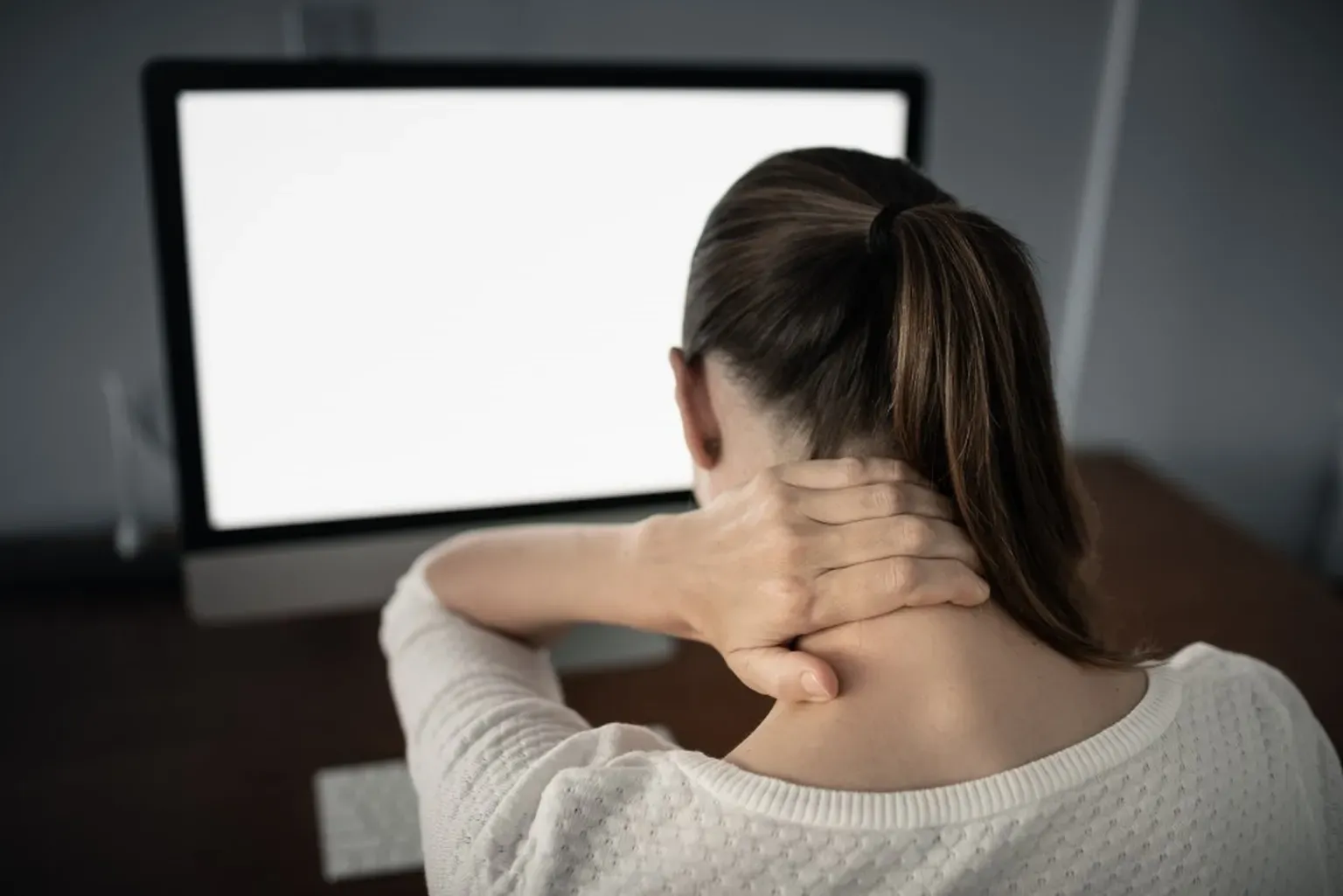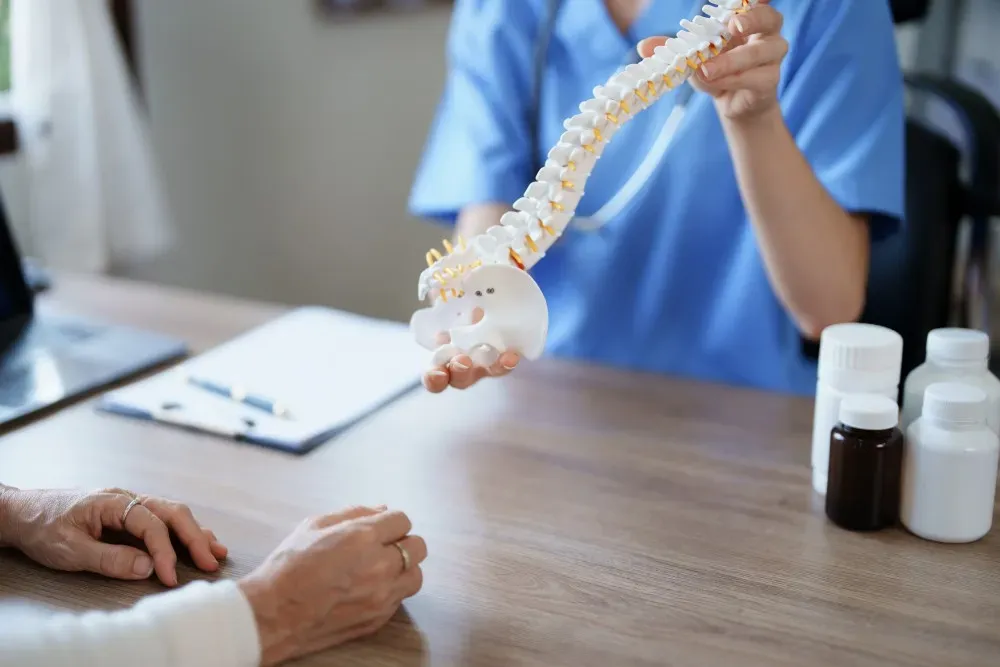Neurosurgery & Orthopedic Surgeons in Jacksonville

What is a Pinched Nerve?
A pinched nerve — also called a compressed nerve — occurs when surrounding tissues press on the nerve roots and disrupt the nerve’s normal functioning.
A pinched nerve — also called a compressed nerve — occurs when surrounding tissues press on the nerve roots and disrupt the nerve’s normal functioning.
The human body contains billions of nerve cells that make up the nervous system. Through these nerve cells, we communicate with the outside world — nerves allow us to feel sensations and react to them. Internally, our nerves send signals to the brain about these outside sensations we’re feeling. When too much pressure is applied to a nerve, it sends a warning signal in the form of pain to your brain.
The most common places where nerves get pinched are the neck, wrists, elbows and back, but a pinched nerve can occur anywhere. Surrounding tissues, bones, muscles, tendons, ligaments and cartilage can all press or pinch nearby nerves.
With proper care and treatment, a pinched nerve will heal completely and resume normal functioning. Non-healing compression can lead to chronic pain and permanent nerve damage.
COMMON CAUSES
A pinched nerve injury can occur as the result of several factors.
- Herniated spinal disc. Spinal discs protect the vertebrae in your spine. If a disc slips out of place (herniates), it can compress nearby nerves. Herniated discs most commonly develop due to natural wear and tear on the spine as we age.
- Bone spurs. Bone spurs are bony overgrowths that form on the ends of bone. They’re commonly caused by arthritic changes in the spine and around joints. These bony overgrowths sometimes press on surrounding nerves or narrow nearby nerve pathways.
- Rheumatoid arthritis. Inflammation from rheumatoid arthritis can compress surrounding nerves, especially around the joints.
- Obesity. Excess body weight places more pressure on your nerves and can cause compression.
- Overuse injury. Repetitive movements can lead to nerve compression when they cause excess pressure and inflammation in the surrounding tissues, tendons and ligaments. Overuse injuries can occur from keyboard typing, playing sports and other hobbies or occupations where you perform the same motions repeatedly.
- Acute injury. Traumatic events like car accidents, sports injuries or workplace accidents can result in a pinched nerve.
- Poor posture and body positioning. Years of slouching, crossing your legs, leaning on your elbows, sleeping in one position all night and improper lifting techniques can contribute to wear and tear that results in a pinched nerve.
- Pregnancy. Carrying around extra weight during pregnancy can lead to nerve compression.
SIGNS AND SYMPTOMS
The primary symptoms of a pinched nerve are pain, muscle weakness, numbness, loss of sensation or tingling in the affected area. It may feel like pins and needles, or like a hand or foot has “fallen asleep.” The pain can be sharp, burning and radiating.
Nerve compression may also cause the following conditions:
- Sciatica. Sciatica develops when nerve compression occurs along the sciatic nerve, which runs from the low back to the lower legs and feet. The sciatic nerve is the longest and widest nerve in the human body. The hallmark characteristic of sciatica is sharp, radiating pain, tingling and weakness that only affects one side of the body. Sciatic pain is usually felt in the buttock, thigh, calf and foot.
- Carpal tunnel syndrome. Carpal tunnel syndrome develops when nerve compression occurs to the median nerve in the wrist. It causes pain, tingling, numbness and weakness in the hand and fingers.
DIAGNOSIS AND TREATMENT
To make a diagnosis, your doctor will ask you about your symptom expression, pain location, recent accidents or injuries and medical history. He or she may take imaging tests like an X-ray, CT scan or MRI. A CT scan or MRI can reveal bulging discs or herniated discs, bone spurs and tissue damage. Your doctor may also conduct a nerve conduction study and electromyography (EMG) to test your nerve function.
Most pinched nerve injuries heal completely within a few days to a few weeks with conservative treatment. Your doctor may recommend some or all of the following.
1.) Rest. Stop or modify activities that aggravate the compressed nerve. Depending on the location of your injury, your doctor may have you wear a splint or brace for a short period to keep the area immobilized and give the nerve time to heal.
2.) Medications. Over-the-counter painkillers can help reduce inflammation and ease pain. You can also receive a corticosteroid injection to help soothe inflammation around the damaged nerve.
3.) Physical therapy. A physical therapist can teach you exercises and stretches that relieve pressure on the compressed nerve and ease your pain. A therapist can also help you practice good posture and body positioning for sitting, standing and sleeping to decrease the risk of future injury.
4.) Surgery. Surgery may be a viable treatment option if you have pain for several months that doesn’t respond to conservative care. The type of surgery you’ll need depends on the location of your pinched nerve. Common surgeries for this type of injury include procedures to remove bone spurs and herniated discs in the spine.
Some people also find relief from hot and cold compresses, massages or acupuncture.
PREVENTATIVE HOME CARE
There are self-care measures you can take at home to reduce your chance of future injuries.
- Practice proper body positioning and don’t remain in one position for too long — uncross your legs, stop leaning on your elbows and stand up straight.
- Master proper lifting techniques using your legs and core muscles instead of your back and never lift a heavy load while twisting at the same time.
- If you’re performing repetitive tasks (like typing), take frequent breaks to rest and stretch.
- Incorporate movement into your days. Use a standing desk at work, or get up often to walk around and stretch. Exercise regularly to keep your muscles and joints strong.
- Maintain a healthy body weight. Eat well and exercise to keep your weight at a healthy level.
INTEGRITY SPINE AND ORTHOPEDICS TREATS SPINE AND JOINT CONDITIONS
At Integrity Spine and Orthopedics, we offer several services designed to treat spine and joint conditions. Our board-certified doctors specialize in minimally invasive spinal procedures, general orthopedics, pain management and regenerative medicine. Our team is trained to manage acute and chronic conditions with treatment plans that will get you back on your feet and back to your normal activities.
Give us a call today at 904-456-0017 to schedule an appointment with us. We also offer free MRI reviews for qualified patients who are looking for a second opinion on their diagnosis.




